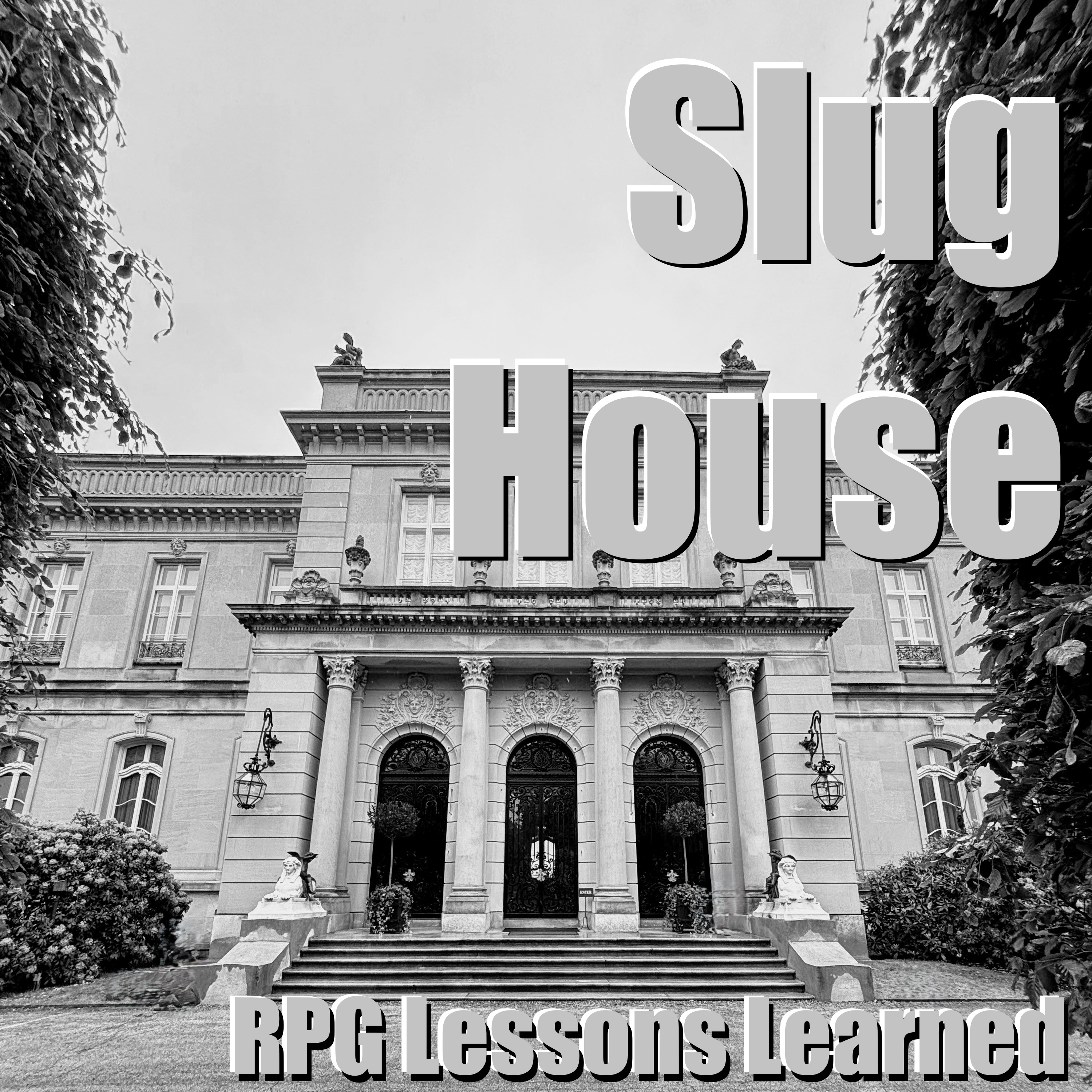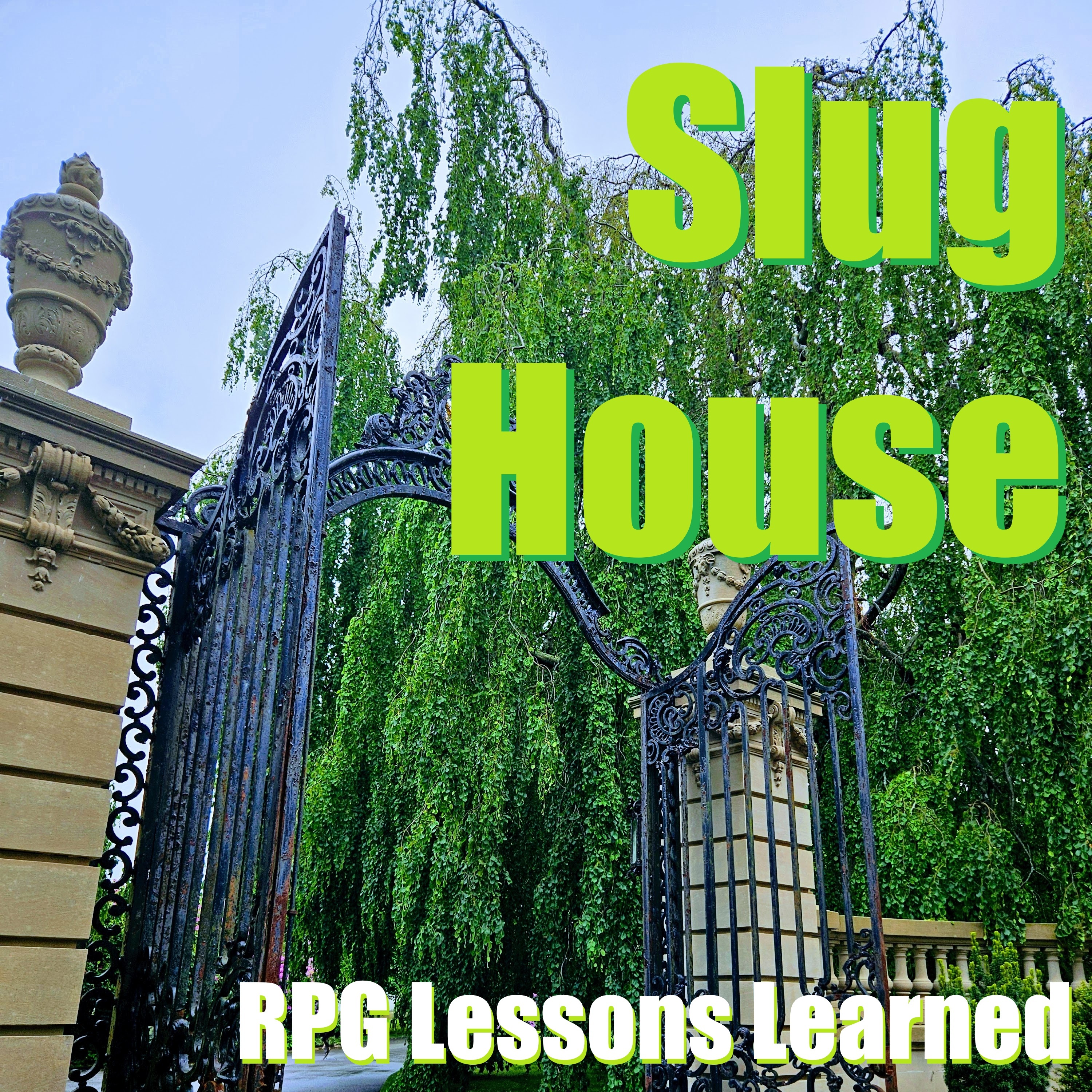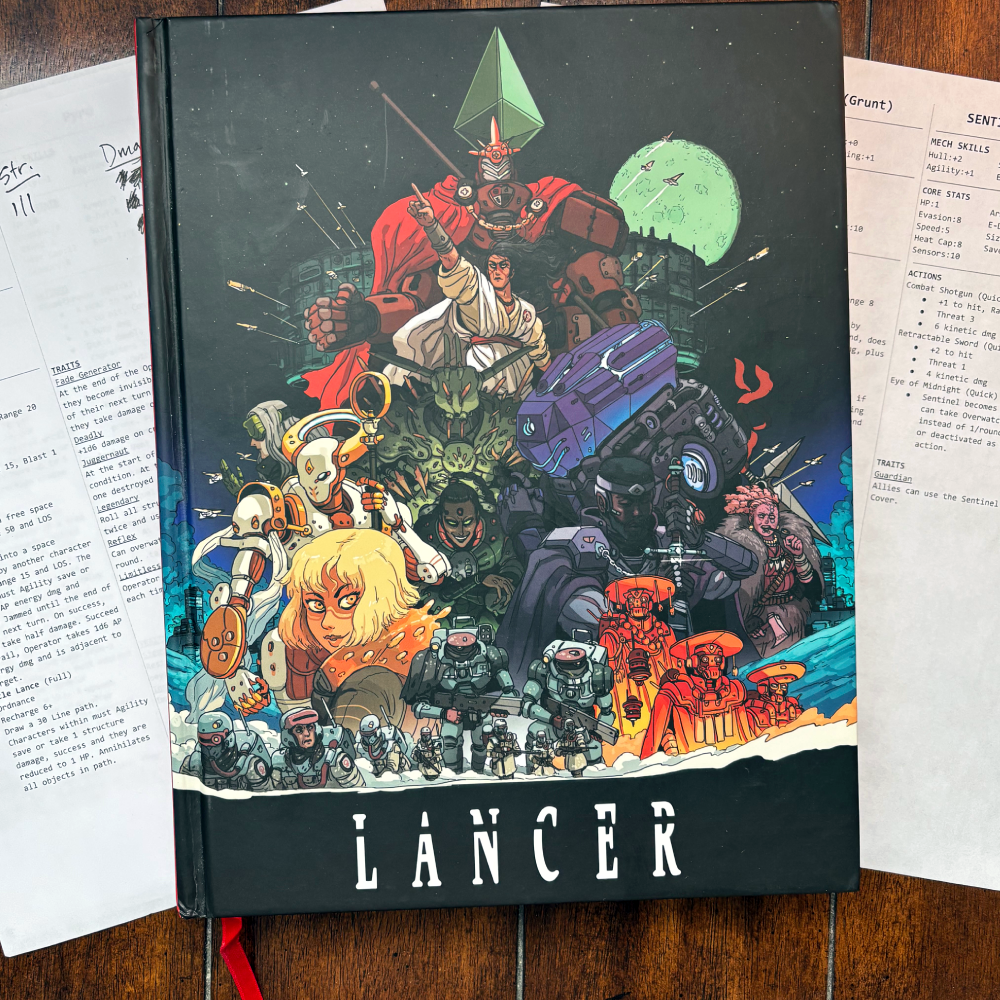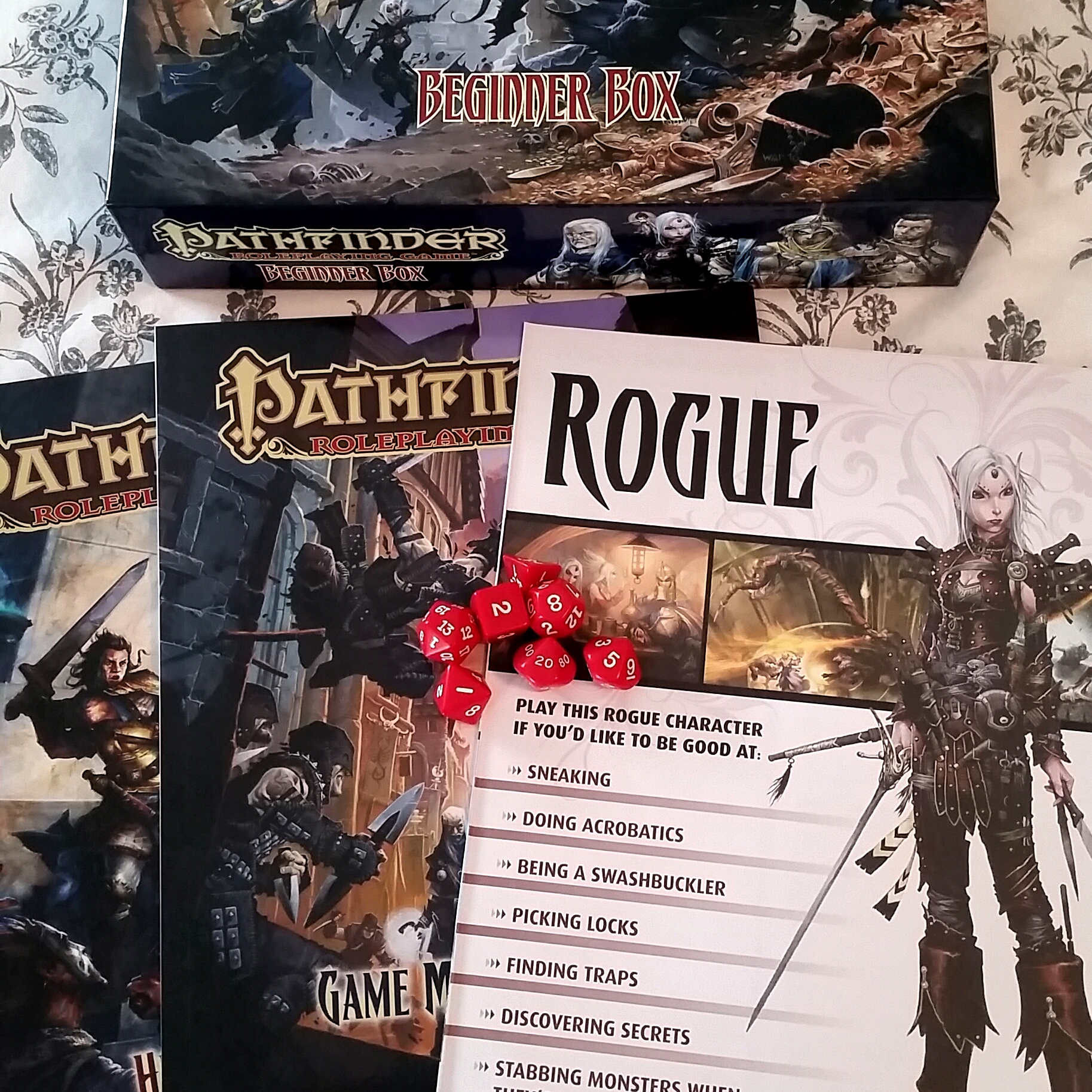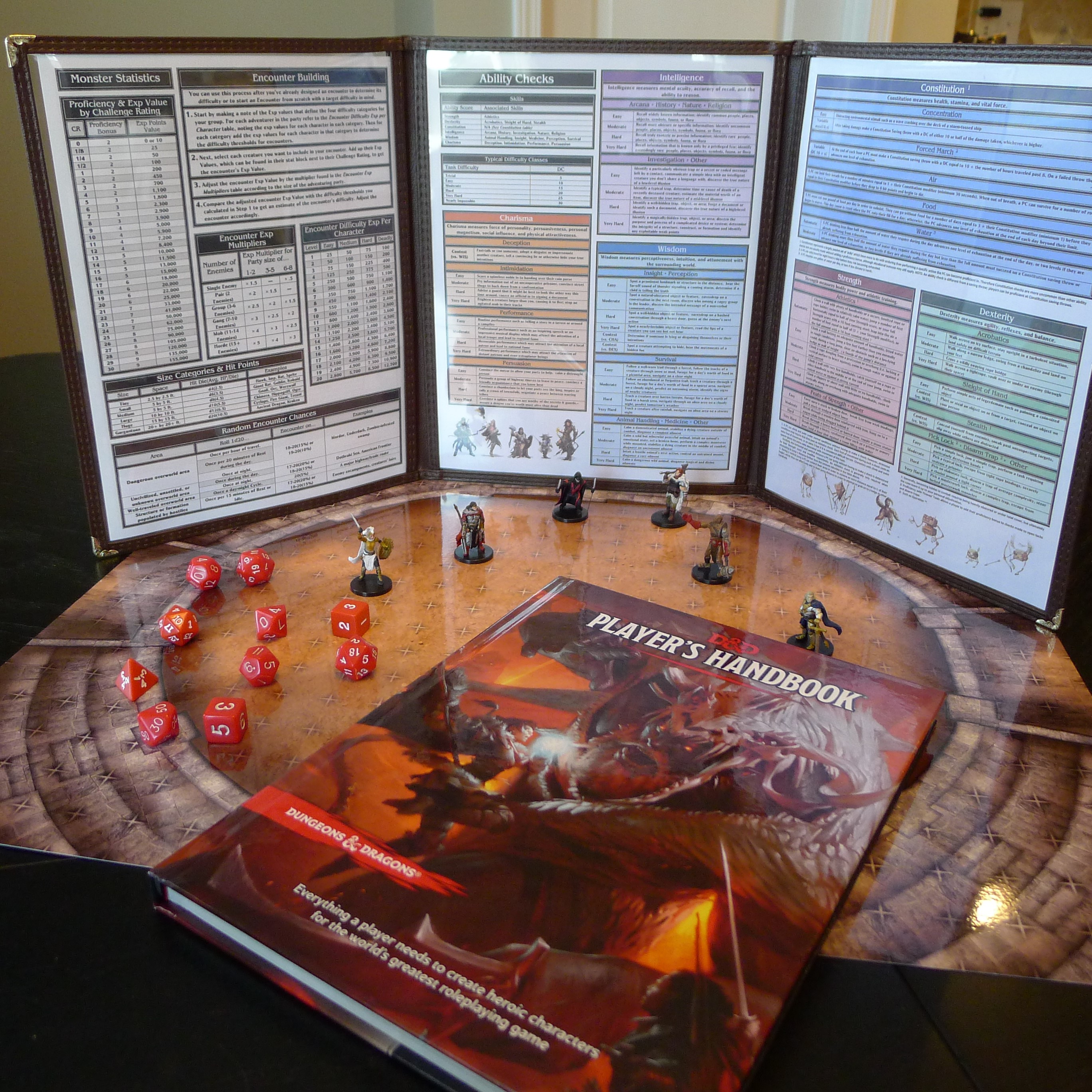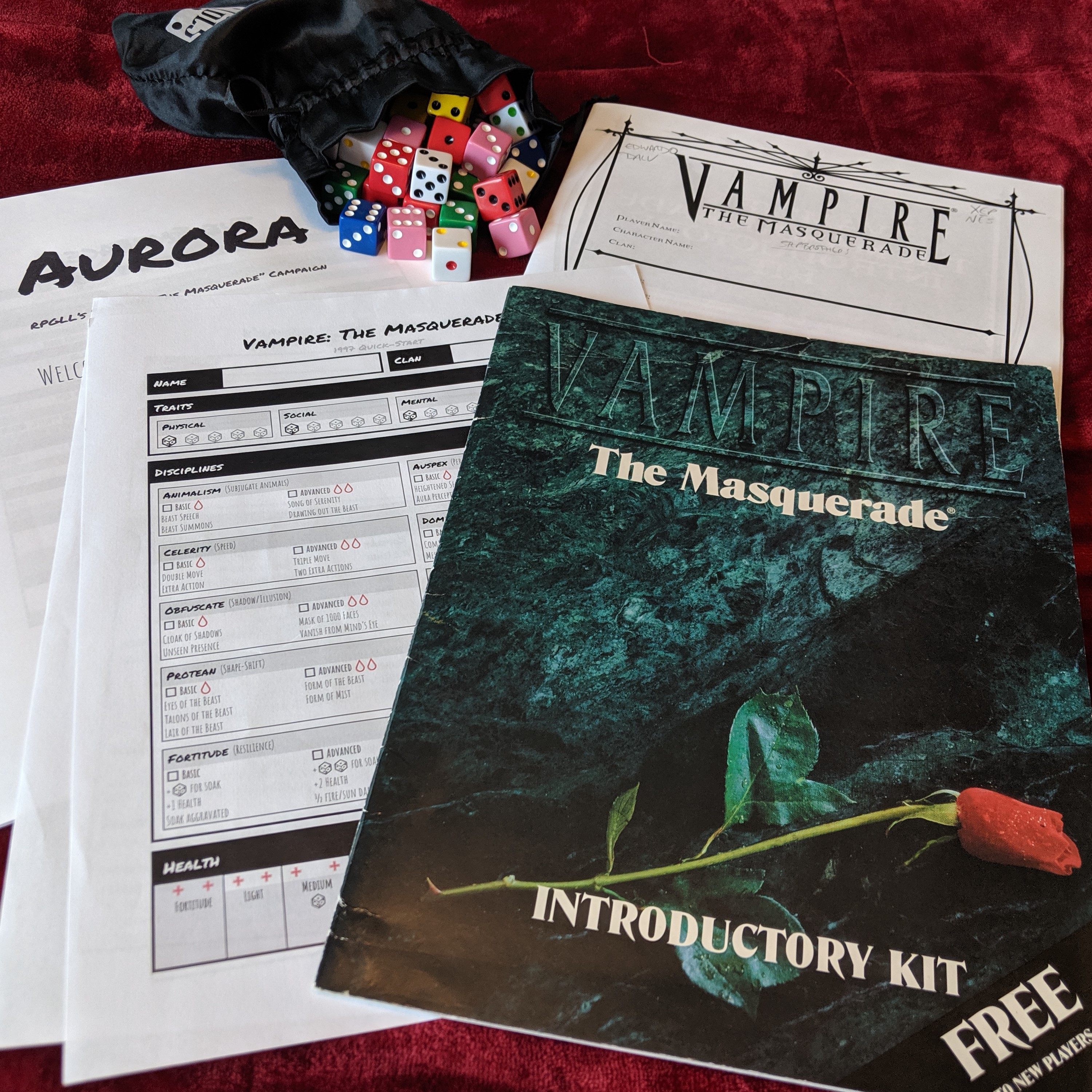[00:00:00] Speaker A: RPG Lessons Learned. When the game is over, when your players are gone, that's when lessons are learned.
Find us
[email protected].
email us at rpgllpodcastmail.com and find us on BlueSkyPG.
Hi. Welcome to RPG Lessons Learned, the show where you can learn from our mistakes. Oh, I'm Dusty. I need to get used to that. And with me, as usual, is Tanner.
[00:00:35] Speaker B: Hey, Dusty. How's it going?
[00:00:37] Speaker A: It's going really well. We just finished, uh, up another session in this unnamed dungeon that I still don't know what it is.
[00:00:46] Speaker B: You know what? You're getting quite close to me being able to reveal the name to you.
[00:00:50] Speaker A: Nice.
[00:00:51] Speaker B: I believe next session I will drop the name and you'll go, yeah, that makes sense.
[00:00:55] Speaker A: Are you shocked at my slow progress?
[00:00:59] Speaker B: No, I like the way that you play. You're engaged, you're always looking at things, you're always investigating stuff. Um, I don't think progress would be faster if I had a group of four people. You know, we've always talked about how one on one games are faster than multiplayer groups, right? I think that is still the case here. I mean, I think you would maybe get more people investigating more things at once just due to manpower, but I'm having a good time. It's a big dungeon. It's the biggest one. Is this the biggest dungeon I've ever run before? This dungeon. This isn't a spoiler. This dungeon has 82 locations, aka rooms. I'm trying to think if I've ever run a dungeon this big before.
[00:01:44] Speaker A: I suppose if you count every hex in Hideous Daylight, along with every room of every dungeon in every hex and hideous Daylight.
[00:01:51] Speaker B: Maybe even then, though, I think there's only like three dungeons that. Yeah, so I mean, it's up there, certainly. So. But I'm wondering if this is a leading question, do you feel like it's going too slow?
[00:02:01] Speaker A: I'm enjoying the game like you said. We didn't start with numeric rating. We should come back to that. I'm enjoying the game like you said. So I don't feel like it's slow in the sense of I'm enjoying the slow burn. I think the slowness is fine. I just always had this vision that people write these dungeons with more than 14 rooms. Uh, and I say 14 because we're hex or hex dungeons. And I think that they, the authors of these dungeons, think that a group can get through it in like a session or two.
[00:02:27] Speaker B: Interesting.
[00:02:28] Speaker A: I have never found that to be the case. I always think dungeons just take forever.
[00:02:32] Speaker B: Well and we also don't play for very long. I feel like our appetite for a game is usually like we set aside two and a half to three hours and we only end up actually dungeon crawling for like two hours maximum. So I think that there could be some assumptions based on, you know, what other people, uh, what other people do. This dungeon does say a level one to three fantasy adventure module. So you know, I think it's accept whether that means is this going to take your characters from level one to three or is this four characters level one to three? You know, I think they're assuming multiple sessions though. Certainly just by, by the scale of this thing. Because each one of these floors of this three floor mansion could be its own dungeon and they're all interconnected. So.
[00:03:19] Speaker A: And I feel like this dungeon is quite lethal. The six skeletons that can presumably only be harmed. Magical weapons which I don't have yet. The gargoyle that can only be harmed. Magical weapons which I don't have yet. I just feel like this is quite a lethal dungeon. Are you toning down the lethality any?
[00:03:37] Speaker B: No. I have ignored wandering monster roles that came up with a monster that is very clearly. So I'll just tell you one of the things that is on this wandering monster table. There are lots of very flavorful things on here. There's the large slime leaving creature that you don't know what it is yet. There are things that are like from the dungeon. And then it's like oh, if you killed these things, cross this off the list. So it's like there is the implication that this is a living list. One of them though entry 8 on the Wandering Monster table is 1D6 Killer Frogs. It is unknown when spawn these frogs but they leap around erratically attacking anything they perceive as a threat.
I don't think that's an interesting entry for a wandering monster table and certainly not one. I don't know. Am I betraying the holy procedure by looking and rolling a wandering monster and being like this sucks and then not doing it?
[00:04:32] Speaker A: I don't think so. I think we all have to edit for our groups.
[00:04:35] Speaker B: Yeah. And you know what? I think it's. It's just tough. I feel bad because, you know, I am a rules follower kind of guy and RPGs. But I'm officially crossing this off the list. I don't want that encounter. It's. It doesn't. Having read the entire thing, it doesn't link into anything. It doesn't add any Flavor besides something to run from or fight. So I feel okay omitting that.
[00:04:58] Speaker A: I feel like Wandering Monster tables are one of the places where, as I read more and more, classic dungeons where classic dungeons fall apart.
Why the hell would I encounter a giant centipede in Castle Ravenloft? If you're going to edit a classic adventure, I think the watering monster table is for sure the place to do it and feel the least amount of guilt.
[00:05:17] Speaker B: Yeah, you should edit it. And I think if you're making a wandering monster table, this is a great lesson of like, make it thematic. Like make it match your setting, make it use creatures. There are a lot of things where it's like, these are the creatures from this room. If they die or flee, replace this entry with this entry. So like, there is some like gaminess built into this Wandering Monster table, which I like. But yeah, I. The killer frogs are stupid and um, I feel fine omitting them.
[00:05:44] Speaker A: I did not get into combat well, no, I did with the gargoyle, but then I ran from it pretty quickly. I've been avoiding combat and I've been doing everything but combat. I've been focusing on exploration and trying to like think my way out of combat. Has that been annoying for you at all?
[00:05:57] Speaker B: No, not at all. I think a lot of OSR people kind of over fascinate themselves with the idea that combat is a fail state and I don't feel that strongly about it. But like, I think that avoiding combat is fine. Like you're exploring a place and not picking fights. I think that's fine. Let's, let's go to our number ratings. I feel like this session was a step above what was last time. Certainly I'm feeling a six to a seven. Six and a half to seven.
[00:06:26] Speaker A: Yeah, I feel a seven. I think last time I was six and you were five and I think. I think I'm seven for sure.
[00:06:32] Speaker B: I followed my advice from last time and I gave myself a printout of the dungeoneering rules and the Wandering Monster table so it doesn't take up real estate of my monitors. So that's a big thumbs up improvement. I'm proud of myself.
Maybe the fastest time that RPG lesson learned advice has ever been used and implemented. Fastest turnaround time. But yeah, that was, uh, that was my main thing. I'm excited for you to continue to explore it. I'm excited that my rules seem to function generally speaking in, in my tan hack rules. So, um, yeah, I don't think I have too much more to say about it other than I'm having a good time and I'm excited for you to find out even more about what's going on.
[00:07:12] Speaker A: Any lessons that you've inadvertently learned from our gameplay today, either about the dungeon or the tan hack system?
[00:07:18] Speaker B: Yes, uh, lesson learned. Number one, follow your own advice. If you're going to have an advice podcast about, uh, giving yourself advice, you should probably follow it. And I did, and it was a big success. Second, Wandering Monster Tables edit for your sensibilities, I think, or if you're going to make one, make them meaningful and make them interesting. And I'm really harping on this. It's a. Out of eight entries on a Wandering Monster table that's supposed to happen one out of six times. So make sure that they add to the game and don't feel like a random encounter from Final Fantasy 2.
[00:07:53] Speaker A: It's a random encounter table, not a rando encounter table.
[00:07:56] Speaker B: There you go. Um, but we are not the only ones who've been playing. Well, I guess you've been playing. We, um, we just celebrated our, our Yuletide, so no idea when this episode is going to come out, but happy Holidays and Merry Christmas and everything in between to anybody listening. Dusty, um, for the holidays you ran some stuff. What was that like?
[00:08:15] Speaker A: I did. I ran the Christmas Krampus dungeon once again for like, ah, oh, third time that we've talked about on the show, but probably like fifth or sixth time overall.
[00:08:27] Speaker B: Wow. So this is. This has to be approaching your. Your Dusk and your Terror on the Kataros. Right. In terms of times run, it's.
[00:08:34] Speaker A: It's surpassed Terror on the Kataro and it is approaching dusk.
Uh, although I have run Dusk for this group as well. But anyway, it's my daugh daughter's friends again.
[00:08:45] Speaker B: Yeah. So, you know, I recently listened to the episodes of us talking about running one game multiple times. I'm trying to remember what one that was. It might have been either talking about Holy Matrimony or maybe Aberrant Reflections, which I ran for my home group before I ran from you. And I think we had a lot of very positive things to say about running one adventure over and over again and really streamlining it and really honing it into something special.
[00:09:14] Speaker A: And for sure this group was the first group that saw the little seeds that I put into the adventure where maybe Santa's not the good guy. Maybe there's a little bit of colonialism going on with Santa trying to gentrify these goblins and he could actually be the bad guy, the aggressor. This group of 12 to 14 year olds were the first group to ever pick up on that. Wow.
[00:09:35] Speaker B: Well, the future is bright. At least a little bit.
[00:09:37] Speaker A: The, uh, future is bright.
[00:09:39] Speaker B: Uh, so how did they. How did they play? Did they have a. It seems like they had a good time.
[00:09:43] Speaker A: They did. I dressed in full on Santa regalia.
Yep. And uh, the children showed up and were not interested in that at all. They're 12, 14 year olds. I would describe their faces as looking embarrassed for me.
[00:09:58] Speaker B: Nice.
[00:09:58] Speaker A: Which is the perfect like preteen to teen face. My daughter is 12.
Um, I don't want to run too many more adventures for these kids. I think I might do like one more maybe.
Um, but several of them are expressing an interest in wanting to dm. Um, so hopefully they spin off into their own orbit and chart their own course of gaming. But for now, I actually had a lot of fun. They all had their feet under them. As far as the rules.
[00:10:27] Speaker B: Excellent.
[00:10:29] Speaker A: So we really just focused on exploring the dungeon room by room. The mirror puzzle where you got to figure out how to break through the mirror into the Krampus realm. They figured that out pretty readily. Uh, and they were off and running in like talking to every dungeon denizen they possibly could with a morale check higher than seven.
[00:10:49] Speaker B: That's awesome. I. That's. That's really special. I love that. Um, one thing I love about that dungeon is how evocative the intro is that you're following the strange light in the north all the way to this workshop. I. I just had a very clear mental image of what that was like and I really enjoyed that. So I'm glad that even, I guess that was like two Christmases ago we played that.
[00:11:12] Speaker A: In fact, Tanner, I didn't tell you this before we started recording. I have now officially posted that adventure on the basic fantasy.org forums for the basic fantasy role playing game.
[00:11:23] Speaker B: Excellent. Let's link to that in the show notes in case anybody missed that the first time and wants to pick it up and take a look at it. But it sounds like you feel real confident about it now, having run it so many times. The kids liked it. Um, um. Last time we talked about how kids will find certain things very funny and kind of make their own fun. Was there too much distraction for that or is that all good in your eyes?
[00:11:45] Speaker A: Anyway, the one piece of feedback that my daughter gave me was that I indulged the children. I did a goblin voice.
They got a good morale check on.
[00:11:54] Speaker B: Goblins, elves or the hobgoblins. Right.
[00:11:57] Speaker A: No, the goblin goblins.
[00:11:58] Speaker B: Oh, the uh, dark. The elves that have been twisted, right?
[00:12:02] Speaker A: Well, not even that. Just the reflection of the elves. The goblin coal miners on the other side that have been brought in to be like toy workers and uh, gentrified against their will. One of the characters knew Goblesh goblin and charmed some goblins. And I did a goblin voice. I did like a, oh, no, like goblin voice. And my daughter's feedback to me was that the kids cracked up at that. And then they spoke to the goblin way more often than they had to just to make me do the voice because I kept indulging them and doing the voice which kept cracking them up. She was like, there was too much of that. You should have stopped doing the voice. And I'm like, that's really insightful, interesting feedback from a 12 year old.
[00:12:44] Speaker B: I like that. I, uh, uh. Do you think it's rooted in like, dad, I can't stand you doing this or do you think it is honest game feedback?
[00:12:54] Speaker A: I think it's honest game feedback on what she felt like slowed the session down.
[00:12:58] Speaker B: That's fair. I have a very similar story of this. When I ran a hex dungeon for my 5e game. I have actually had had this happen a couple of times where I just like pick a voice for a character and my players get obsessed with it. And one of them, the more recent one, was when I ran the slime tunnels of alora for my 5e group. One of the room descriptions in that is a wall of pockmarked holes in which slime slugs cry out to want to be born and midwifed by the players.
So I had a voice of I just want to be born and my players will still bring that up to me. And then the other one I had was, uh, when I ran Hot Springs island. One of the random encounters you can get for that is a stone imp. And they are described as toddler like creatures that will only ever ask questions about what's happening and what's going on and what does this mean. And so I had a good stone voice and they, they liked this little stone boy that would just follow them around. So your daughter's feedback is fair if one player is not into it. But you know what, voices are kind of fun in, uh, in small, small doses.
[00:14:12] Speaker A: I also think sometimes the voice will like, manufacture a core memory.
[00:14:15] Speaker B: Yes, absolutely.
[00:14:17] Speaker A: All of a sudden that session becomes unforgettable. And if you're not making memories, what are you doing?
[00:14:21] Speaker B: Yeah, exactly. So I would say follow your daughter's advice, but not the biggest deal in the world. If that's the worst thing that you could have, like your, your funny voice was too funny, I think that's fine.
[00:14:31] Speaker A: Well, I think the point is follow my daughter's advice too. After like three or four times.
[00:14:36] Speaker B: Yeah, that's fair. So did you make any final adjustments to the adventure after this? This time running it?
[00:14:43] Speaker A: I really needed to name more. I've got to learn to name everything because you never know when you're going to roll a 12 on a morale check or. Sorry, not a morale check. A.
A reaction role.
[00:14:53] Speaker B: Yeah. And they want to be best friends.
[00:14:55] Speaker A: And they want to be best friends. So I have just got to name stuff. And when I'm caught flat footed, and I think nothing breaks immersion more than when they're like, what's its name? And I'm like, uh.
And they're like, oh, it wasn't important. And one of the kids literally said, oh, it wasn't important. Yeah. And I was like, damn it.
[00:15:12] Speaker B: Yeah. But you know what? He's got a, he's got a gamer's brain.
[00:15:15] Speaker A: He's.
[00:15:16] Speaker B: He's there for, he's there to win. Um, but yeah, that's fair. I like having a. The number one thing that I put on my, um, GM screen is a 200 names. Like that's a very easy compact thing and you don't even have to roll for it. Just like grab the first name that your eyes land on. They're not going to remember that you named this guy Garibaldi. And the guy in the next adventure five sessions from now, Garibaldi. Also, like, just pick a name and.
[00:15:40] Speaker A: If you're reading from something, they have no way to know if it's a random name list or if it's that goblin or elf's actual.
You're consulting something and reading a name.
It's not immersion breaking. They can choose to believe that that is the name for that thing in that room.
[00:15:57] Speaker B: Yep. It's a little bit of verisimilitude, which keeps everybody engaged. So, um, congratulations. So you said you, you're thinking about running one more firm, huh?
[00:16:06] Speaker A: Uh, one more probably the Veiled Society. Like a murder mystery.
[00:16:10] Speaker B: Love it.
[00:16:11] Speaker A: And then I would get to run that one twice because I've still only run that one for you.
[00:16:15] Speaker B: Yeah.
[00:16:16] Speaker A: And then I would set them off into the world and refuse to GM for them anymore and teach them the lesson of I'd start taking the dad tack of no, no, if you want.
[00:16:25] Speaker B: A game, you gotta run for me.
[00:16:28] Speaker A: You gotta. You gotta write your own dungeon.
[00:16:29] Speaker B: I love it. That's excellent. So lesson learned. Um, I'll throw one out there. Keep polishing, um, your diamond. You know, just because you made something cool doesn't mean you can't, uh, improve it every time you run it. And that's part of what the show's about, but also it can kind of go towards an individual adventure too. Right.
[00:16:48] Speaker A: And nothing gives the illusion of you being a better GM more than running adventures that you've previously ran that you know really well. Yep.
[00:16:56] Speaker B: And then nothing can shatter that illusion by not having a name for a goblin.
[00:17:00] Speaker A: And then do we have time for. You mentioned to me that you were kind of at a crossroads in your Lancer campaign and maybe experiencing a bit of writer's block.
[00:17:08] Speaker B: So I might need to do a little bit of a lore dump on you to explain where we're at and where I'm trying to go, and then maybe you can help me link those two things together. How's that sound?
[00:17:17] Speaker A: Let's take a lore dump.
[00:17:19] Speaker B: So my players characters have gotten involved with a revolution on an oppressed planet.
One of my characters is from the noble ruling house on that planet, and he has chosen that he wants to help the rebels to overthrow this old feudal government that's been keeping people. I also have players who are very interested in the cybernetic, transhuman, cyberpunk parts of Lancer. The idea of AI as gods and infusing themselves and connecting with super powerful AI. Right. This is planning to be the penultimate session. What I'm going to have, what needs to happen is that the players are going to this space station called a meta vault. Okay. And inside this meta vault, real space, hyperspace and legion space. The realm of AI is all over laps if you want to think of it. This is where like, this is essentially like a magical pocket dimension with sci fi accoutrements. And the idea is they are going to go to this meta vault to gain its treasures, which is going to be a fleet of ships that are powerful enough to impose their will upon anything. One of the main aspects of mech fiction that I really wanted to explore is that mechs people have high minded ideals and character motivations. But mechs are weapons of war. They cannot build bridges or schools. They cannot convince somebody that what they're doing is wrong. There are weapons of war that kills.
And I want to put them in this last encounter with saying, okay, you're coming back to this revolution and you have a fleet that can kill anything. How Are you going to accomplish your goals if all you're holding is a gun? Does that make sense? Uh, so I am trying to think of challenges at this meta vault for them that will not only engage the players who want to investigate the AI stuff, but I also want to kind of maybe experiment with the structure, with the fact that anything could happen in this meta vault. It's like a pocket dimension. I was thinking about making it like a point crawl where they have to get certain things around this area and each point is like a point of interest. That's, ah, a weird gonzo, strange thing that kind of reinforces the theme of the campaign or appeals to one of my players interests.
[00:19:50] Speaker A: And this is your. You said penultimate. Is this your final session?
[00:19:54] Speaker B: No, penultimate. So the next session after would be. They have the fleet, they're at the planet. How are you going to accomplish your goals? You can't bombard somebody into. Into liberating them. You know what I mean? Like, I want them, I want to present them a situation where they're holding a sledgehammer and they've got to do brain surgery to get this society back on track. And like the struggle with the fact that mechs are weapons of war. Like, that's the commentary. The theme I want to have in that session.
[00:20:24] Speaker A: Ooh, and is this the point where I can start brainstorming ideas that you. By the way, uh, let's do etiquette real quick.
[00:20:31] Speaker B: Yeah.
[00:20:31] Speaker A: If you use these ideas or not, I will not be hurt. If you shoot down the idea, I will not be hurt. I'm not party to your game. I'm not party to your table. I'm throwing out random things based on this 90 second to 2 minute lore dump that you've done, not the rich experience you've had at your table. So no offense taken whatsoever if you don't use any of. That's fair.
[00:20:51] Speaker B: Yep. And I maybe if you have follow up questions, I'd certainly be happy to answer to kind of direct your lines of thought.
[00:20:58] Speaker A: Oh, that's not the kind of guy I am, Tanner. I'm a corporate middle manager. I'm going out. Ideas now.
[00:21:03] Speaker B: Excellent.
The stream merely passes through you. It does not begin or end.
[00:21:09] Speaker A: Tell me, I'll throw an idea, tell me how it's wrong, and then we'll adjust from there.
[00:21:12] Speaker B: Yeah. Excellent.
[00:21:14] Speaker A: Um, a couple of things come to mind, one of which would be very frustrating to the players, but would I think you want to frustrate the players. You want them to have that sledgehammer slash brain surgery moment. And that is going to be frustrating. I think the way you do it is they show up somewhere where the crisis is. A humanitarian crisis. Yeah. Something has happened. Call it Hurricane Katrina. And again, sorry, for the purposes of the game, I hate to reference something that people in the audience might hear and have very real and horrifying memories of, but think of these real and horrifying things that have happened. The COVID 19 pandemic, Hurricane Katrina, um, the more recent hurricane that ripped through western North Carolina. Helene. Something could have happened. Some environmental thing that's caused a humanitarian crisis. And they show up with this massive fleet and they have to like. The choice they've got to make is they can only take people away, save people, do good things. If they literally jettison weaponry.
[00:22:10] Speaker B: Mhm. I like that. That, that's awesome. I'm making notes of this, by the way, so if you see my head down, I'm. I'm taking notes. I love that. The idea that they must actually lose weaponry. They have to give up their power to save people.
[00:22:24] Speaker A: Yeah. They've got to sacrifice the ability to make war to save people. That's one idea. Another completely unrelated, totally different idea.
Didn't you tell me that you had a player who really was obsessed to AIs, uh, and almost wanted to become one?
[00:22:38] Speaker B: Yes. And that's kind of like, I'm like, there has to be something in this, in this meta vault that could be like, is he going to donate his brain to be a co processor for this AI or something? I don't know. Like, what are you thinking?
[00:22:51] Speaker A: So here's my, here's my other idea. And I don't think these two ideas work in concert. I think they're exclusive. I think the fleet shows up, does whatever and some AI makes it clear, like the ultimate futility of warfare. Like, hey, yes, you have this, you have this great fleet. Sure.
But we're past. We're post scarcity, we're AIs, we're infinitely patient. And by the way, we're working on a fleet twice as big as yours and your lifespan is fleeting enough that I'm going to win. This is ultimately futile for you. Congratulations.
But here's what we will do. Let's game this out. And somehow in roll 20, change all the backgrounds to be blue, change all the tokens to be blue. Make it like a holographic. Yeah, hologram. And give your guy who wants to be an AI, uh, give him a chance to become AI. Like he has to be the interface through which the game will flow. And have just this ultimate huge battle with all blue tokens on an all blue grid or green or whatever to make it clear that it's in virtual space, but also make the humanitarian cost real. Have the AI say, like, look, we're going to destroy real equipment and kill real people here every time something happens in the simulation and have like, every time something bad happens, like missiles miss or something and hit a random building. Have a little table where you roll up like faces that are flashing on their screens of real people that the air is murdering to reflect the real world casualties and give them these little vignettes with like a first and last name. Like, hey, your missile misses and you just killed. Uh, I'm going to make up a name, but I'm afraid it'll be somebody's name in real life. So I'm, ah, hey, John Smith. You just killed John Smith. And here's John Smith's picture. And John Smith was 27 years old, studying to become an EMT. Whatever. Um, and I think that'll really both these things because that'll suck the fun. Here's what that does. What this does is it sucks the fun out of combat. It makes the hubris of combat where like, I'm exerting power over you, but I'm also damning these people that I've never met or seen or heard from or thought about to worse lives or death because I'm focused on taking out my enemy, not thinking about the collateral damage. It makes them confront the collateral damage and ultimately shows them, uh, like combat is not really fun or cool and ultimately is in real life to be avoided.
[00:25:09] Speaker B: My players aren't acting in self defense. They're effectively trying to institute a regime change. And even if you're doing a regime change for quote unquote, the greater good, you have to do a lot of evil on that way and no one can say if it's worth it or not.
[00:25:25] Speaker A: Yeah.
[00:25:26] Speaker B: Um, so going back to kind of the structure of this meta vault, though, I'm, I'm kind of operating with the idea that in the ultimate session, I love that these ideas for being the ultimate. The last session of this humanitarian crisis that they have to.
Or maybe, maybe the encounter with the AI happens and then they realize that this humanitarian crisis that happened while they were away from the planet is something that, um, they need to deal with in the last session. But I want to explore like what is going to happen specifically in the meta vault and what is the structure of that game to get them the fleet. And I like the idea of this, it's like a, uh, pocket dimension out of space and time where this ancient AI known as Ra lives. Like, that's already been established. So, like, what kind of challenges could they encounter there that earns them this fleet that I can then hit them in the feels with.
[00:26:24] Speaker A: Do you remember that episode of Star Trek the Next Generation where Picard was forced by a probe to live an entire lifetime in an alien society? Just. So, okay, uh, I'm going to summarize it, and probably poorly, because I haven't watched it in 20 years or more.
Uh, the Enterprise encounters this probe. It's incredibly advanced. It scans Picard, and all of a sudden, Picard wakes up on an alien planet. Everyone's calling him a different name. And ultimately what happens is he accepts that after years of being here, months, years, whatever, that all the Enterprise stuff was a delusion. He's now a guy on this planet named Whatever. He lives his whole life. He dies of old age, and then instead of dying, these people that he encountered tell him, hey, this is all a simulation. Our society is about to be lost, and we're making these probes to spread word of who we were and. And our cultural identity. And you've just experienced that. And then the probe, like, gives him the flute that he played as the guy as he lived out this full lifespan, and then he wakes up on the Enterprise with the flute.
[00:27:25] Speaker B: That's like an H.P. lovecraft story. Almost like having to live an entire life in. There's a really good Junji Ito. Are you familiar Junji Ito, the horror manga artist?
[00:27:36] Speaker A: I'm not.
[00:27:37] Speaker B: Okay. He had a really great short comic about a guy in a mental ward, and every night he goes to sleep, he. He's awake for longer. So first he experiences, like, a day while he's asleep, and then a week. And then, like, eventually, in the time when he sleeps, he dreams a lifespan of 10,000 years. And he wakes up and he's like, don't put me to sleep again. I can't do this. Like, again and again, but nothing can stop it. And, like, that's almost like a horror thing. So. Sorry. Anyway, like, how does this apply to their situation?
[00:28:15] Speaker A: Um, again, back to the idea of having to confront collateral damage.
Not whole lives, but maybe this. What you said name was Ra. Maybe Raw creates situations where, okay, you're now this refugee, and here's the battle map, and you have to get across it without dying and make it very difficult and, like, make them do, like, two or three of those and experience what it's like to be collateral damage and then have Rod teach them some object lesson about, you know, I have this infinite capacity for storage and processing and I see all these moments with my, you know, surveillance. I don't know, whatever you want to call it.
[00:28:54] Speaker B: Mhm.
[00:28:54] Speaker A: And I can calculate the true cost of war. You cannot.
[00:29:00] Speaker B: So they're almost like, um. Mini.
I don't want to say many games, but mini. Scenarios that only last for, like, you're this person. You're this person. You're this person. We'll use the Lancer rules. Let's see if in the middle of a mech fight, any of you can make it across the street. Or something like that.
[00:29:17] Speaker A: Exactly. Yeah. And what's so obvious to it, with its tremendous perspective, both in terms of breadth and depth? Uh, it's trying to make obvious to some people.
[00:29:29] Speaker B: Yep.
[00:29:29] Speaker A: Anyway, those are my ideas.
None of that called on my 4e background. I was hoping to dust off some old 4e knowledge.
[00:29:37] Speaker B: Well, I mean, I can certainly design combat encounters too, because there are cultists who worship Ra. Ah. Who would want to defend this meta vault from the players. So like, maybe the players have a goal to like, actually enter the meta vault, but it's guarded by these cultists who want to keep them out. Or something like that. Could be a 4e encounter easily.
[00:29:56] Speaker A: Yeah. So the first thing, like, if you. How much armament can you dump to carry how many civilians? And do you have enough armament to make it across the map, pick up civilians and back?
Or do you not have enough armament and you die with the civilians that you're trying to like, what's that balance of how little armament can you go in there with and still be able to rescue people?
[00:30:19] Speaker B: Yeah. How do you feel about point crawls? We've talked about hex crawls and stuff a lot, but like, do you have an opinion on, like, here's a. Here's a space abstracted as points. You can go from one to another. Or should I make this a strictly linear thing? Do you think?
[00:30:35] Speaker A: I dislike point crawl so much that I basically invented Hex crawls?
[00:30:40] Speaker B: Yeah. Um, so let me just explain. I guess my interest in applying a point crawl to this meta vault would be because it's a place where anything can exist. And I like the idea of switching up, like, it's been a very linear game.
I like the idea of switching up the structure a little bit and trying to say, okay, you can go to all these different locations and maybe you're looking for something at these locations to unlock the keys. To the fleet. I guess the fact that the possibility space inside of meta vault is insanely huge. It would feel weird if it was a linear thing. But RAW is all powerful inside the meta vault. So like.
[00:31:20] Speaker A: But networks do have nodes, so maybe if you did this. So generally I find point crawls annoying, um, because the relation between the points, I struggle with that. But if you think of like, public transit and those really, really abstract maps, they'll give you. Yeah, where it looks linear, but in reality the track goes all over the city.
Um, but it's linear to help you understand what your next stop is, not to help you understand where the stops are in relation to each other. If you gave them something like that, where you're like, hey, this is a computer network. It is a neural network. There are nodes. You can't instantly go from this scenario to this scenario. You have to go like, maybe up this branch of nodes and down this branch of nodes. Maybe it's almost like a family tree. And how much backtracking do you have to do to get back down to the particular outcome that you want?
[00:32:07] Speaker B: But is backtracking even, like, worthwhile if I'm not, like, costing them resources to move from node to node?
[00:32:14] Speaker A: I mean, cost them resources. Just don't. They just don't rehab the combat encounter. Right. But it costs them some amount of time to have to backtrack and go back down.
Okay.
[00:32:26] Speaker B: So that has to cost them something to move from node to node.
[00:32:30] Speaker A: Otherwise there's just no structure to it. If I can just instantly go from here to here, then what's the point.
[00:32:36] Speaker B: Of the web to begin with?
[00:32:38] Speaker A: Right.
[00:32:38] Speaker B: Yeah, yeah.
[00:32:39] Speaker A: And the whole idea behind a large language model, or AI is that it's building this network of connections that's so unknowable to humans that it's essentially a black box.
[00:32:49] Speaker B: Right. Interesting. I like that. Um, all right, that is definitely giving me something to chew on. Um, I think I'm going to make it smaller than I anticipated because I kind of it. When I was first sketching it out, I was putting like their entrance in the middle and then maybe having like 10 nodes around them that they would go to. But I think I'm going to do like five or six, like something to keep it, like maybe even one node is just like a role playing encounter. One node is a combat encounter. One node is, you know, just something to keep it kind of keep the levels of interest and, um, the variety up.
[00:33:26] Speaker A: Do a Groundhog Day thing. They can replay a node from the beginning as many times as they want, but it costs them time. And how perfect is perfect enough before they're willing to move on? And how much time does that cost them to achieve their goal? But imagine, like, if it's. If that. If this node is a combat, let m. Me go in and be reckless and figure out everything is.
And then I'll spend whatever the resources I'm spending to replay that scenario. Now, knowing where everything is, does that.
[00:33:53] Speaker B: Work when a combat encounter in 4e, aka Lancer, is three hours long?
[00:33:57] Speaker A: No, it does not.
[00:33:58] Speaker B: Because at that point, what you're saying is, I'm way. I'm choosing to commit our real time social life. You know what I mean?
[00:34:05] Speaker A: Yeah, no, you're right.
[00:34:06] Speaker B: And I. I love that idea. In a different system.
[00:34:09] Speaker A: Yep. Use some of this. Use none of it. Use all of it. It's all good. I. How could I possibly give you advice in two minutes?
[00:34:16] Speaker B: Yep. Well, hopefully that was at least interesting to listen to too, if, um, you're struggling. I mean, like, writer's block is a huge thing in terms of, like, narrative style games. Even though Lancer is a very combat heavy game, the combats are all 100% informed about the choices my players are making. So I do my best brainstorming while commuting for work.
So I think I'm going to let it stew. I don't have to run for another couple of weeks, so I really want to make this special. And then I love your idea for the. The fleet and the hologram, um, and the humanitarian crisis. I think I'm going to save all those ideas for the last session, but I like that Ra is trying to create these parables for them to play through in. In the meta vault to get their point across, and then saying, hey, you know what? If you still want it after experiencing all that, here's the keys to the ship. Fair. Alrighty. Well, thank you for listening, everybody, and take care.
[00:35:14] Speaker A: People call them reviews, postmortems, retrospectives.
We call them lessons learned, and we're sharing ours with you.
